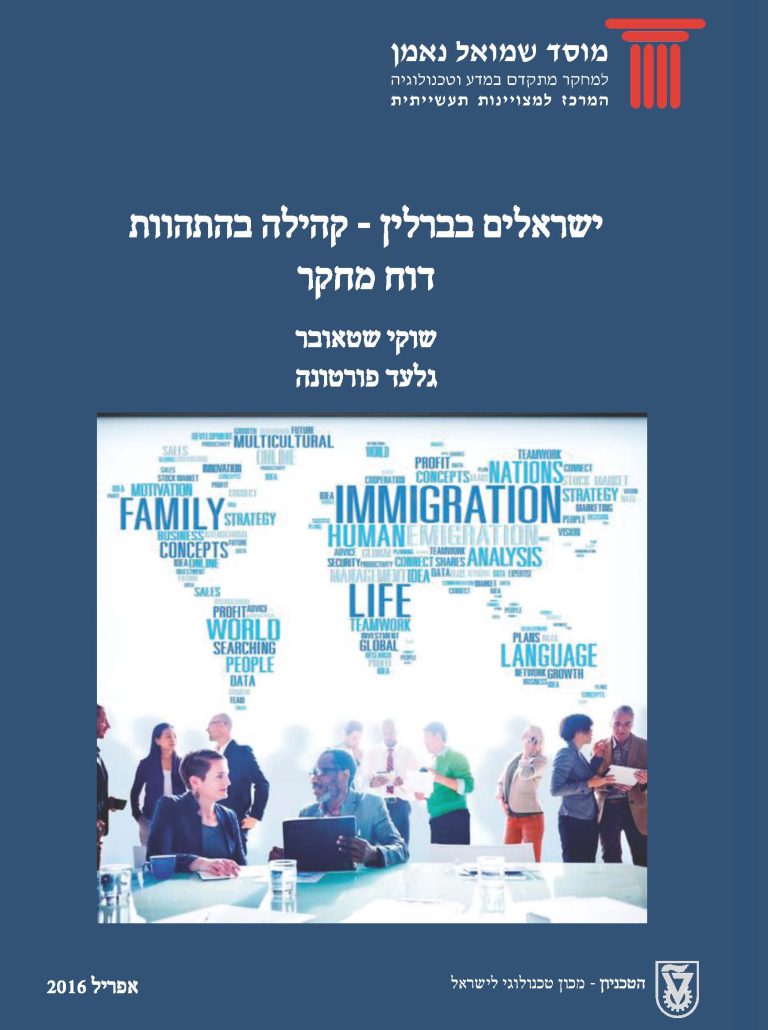Over the years, the phenomenon of emigration from Israel has been harshly criticized by the public and the country’s leaders, and has been seen as a betrayal of the values of Zionism and opposed to the national conventions. Since the late eighties, this phenomenon has intensified, following the economic, social, cultural, and political changes in Israel and the globalization processes.
The purpose of this study was to examine the motives of the Israeli emigration to Berlin despite the language limitations and the political history of Israel and Germany, the formation of community life of Israeli immigrants in Berlin, and the life perception of Israeli immigrants living in Berlin. The study involved 85 people, divided into two main groups: 61 immigrants and 24 other relevant interviewees, including officials from Israel and Germany and researchers and journalists engaged in the relations between Israel and Germany.
As part of the data collection, three waves of migration were discerned: the first, until 2000, was characterized as “romantic migration.” This wave was followed, during the first decade of the 21st century, by a wave of social political migration; and thereafter, during the first half of the second decade, a wave of economic migration occurred.
Among the study population, 12 reference groups were characterized, such as migrant workers in the sectors of real estate and high-tech, artists, former immigrants to Israel, and Israeli Arabs. In addition, a group of “Hebrews” was characterized, who emphasize their connection to Judaism, based not on a link to religion or nationality, but on their connection to the Hebrew language and culture.
The study findings reveal four main factors that encourage immigration from Israel to Berlin: dissatisfaction with life in Israel, the realization of personal potential through finding a job with development horizons and/or acquiring higher education, immigration following the migration of a spouse to the city or marriage to a German spouse, and the unique character of Berlin as a multicultural city where the cost of living is relatively low.
In addition, the study found that Israeli immigrants maintain regular contact with each other, in particular with members of their reference group, together with their ties with Germans and/or other nationalities living in Berlin. The Israeli immigrants maintain ties between each other in four ways. 1. Social media constitute a key communication tool, connecting Israeli immigrants in Berlin. 2. Local community initiatives, designed to create a scene of constant encounters, later also offer a variety of educational and cultural services that will meet the needs of the emerging community. 3. Action scenes of Israelis in Berlin: meetings and activities that are not necessarily designed for an Israeli audience, but for those who wish to get to know the Israeli culture. In practice, the ‘Israeliness’ of these activities attracts also Israelis living in Berlin. Varied sporadic meetings also take place alongside these activities, such as performances by artists from Israel. 4. Education systems: parenting children serves as fertile ground for meetings between Israeli parents through the schools where their children are educated. These connections are created as a result of friendships that develop between the children themselves or out of utilitarian considerations, such as shared learning.
The study findings indicate a relationship between Israelis in Berlin and members of the Jewish community of Berlin and its institutions that is limited in scope for several reasons: the lack of a need for religious services and education provided by the community, culture and mentality differences, and the low reputation of the community. It was also found that the frequency of visits of Israeli immigrants to Israel is usually between twice a year and once every two years, usually to visit family and friends and for making various arrangements. It should be noted that there is a relationship between the immigrant’s age, length of stay, and frequency of visits to Israel: the young visit Israel more than the older ones and new immigrants visit more than veteran emigrants.
The findings show that the majority of the respondents did not experience anti-Semitic or hostile attitudes, except for a small number who experienced expressions of hostility, mainly verbal, in times of military conflict between Israel and the Palestinians. A significant part of Israeli emigrants think that Germany has made a genuine correction, and today it is a completely different country as compared to what it was before the Second World War.
It is apparent that in recent years, Berlin has been a convenient target for those who wish to consider the possibility of living abroad, in particular young people, and therefore, can be regarded as also a gateway to the world from this perspective.












